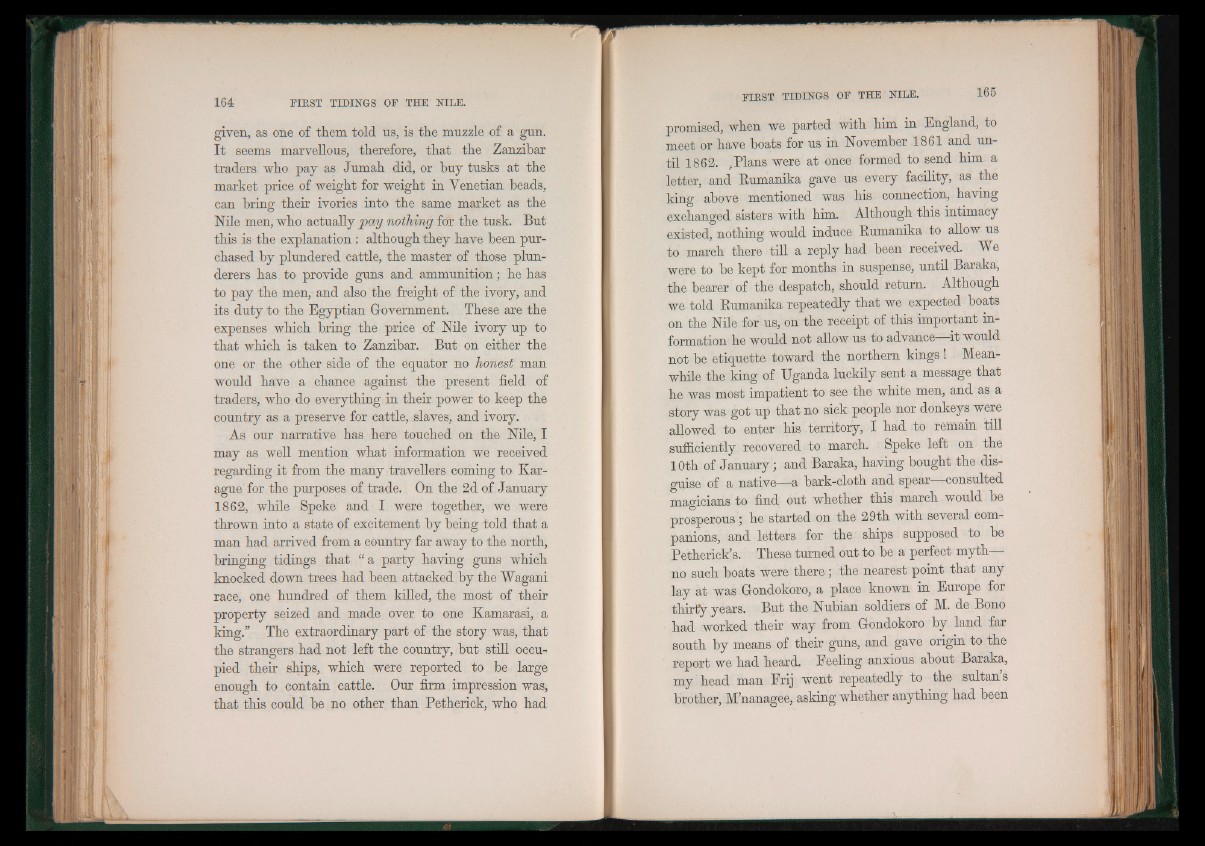
given, as one of tliem told us, is the muzzle of a gun.
I t seems marvellous, therefore, that the Zanzibar
traders who pay as Jumah did, or buy tusks at the
market price of weight for weight in Venetian beads,
can bring their ivories into the same market as the
Nile men, who actually pay nothing for the tusk. But
this is the explanation : although they have been purchased
by plundered cattle, the master of those plunderers
has to provide guns and ammunition; he has
to pay the men, and also the freight of the ivory, and
its duty to the Egyptian Government. These are the
expenses which bring the price of Nile ivory up to
that which is taken to Zanzibar. But on either the
one or the other side of the equator no honest man
would have a chance against the present field of
traders, who do everything in their power to keep the
country as a preserve for cattle, slaves, and ivory.
As our narrative has here touched on the Nile, I
may as well mention what information we received
regarding it from the many travellers coming to Kar-
ague for the purposes of trade. On the 2d of January
1862, while Speke and I were together, we were
thrown into a state of excitement by being told that a
•man had arrived from a country far away to the north,
bringing tidings that “ a party having guns which
knocked down trees had been attacked by the Wagani
race, one hundred of them killed, the most of their
property seized and made over to one Kamarasi, a
king.” The extraordinary part of the story was, that
the strangers had not left the country, but still occupied
their ships, which were reported to be large
enough to contain cattle. Our firm impression was,
that this could be no other than Petherick, who had
promised, when we parted with him in England, to
meet or have boats for us in November 1861 and until
1862. ,Plans were at once formed to send him a
letter, and Rumanika gave us every facility, as the
Ving above mentioned was his connection, having
exchanged sisters with him. Although this intimacy
existed, nothing would induce Rumanika to allow us
to march there till a reply had been received. We
were to be kept for months in suspense, until Baraka,
the bearer of the despatch, should return. Although
we told Rumanika repeatedly that we expected boats
on the Nile for us, on the receipt of this important information
he would not allow us to advance- it would
not be etiquette toward the northern kings! Meanwhile
the king of Uganda luckily sent a message that
he was most impatient to see the white men, and as a
story was got up that no sick people nor donkeys were
allowed to enter his territory, I had to remain till
sufficiently recovered to march. Speke left on the
10th of January; and Baraka, having bought the disguise
of a native—a bark-cloth and spear—consulted
magicians to find out whether this march would be
prosperous; he started on the 29th with several companions,
and letters for the ships supposed to be
Petherick’s. These turned out to be a perfect myth—
no such boats were there; the nearest point that any
lay at was Gondokoro, a place known in Europe for
thirty years. But the Nubian soldiers of M. de Bono
had worked their way from Gondokoro by land far
south by means of their guns, and gave origin to the
report we had heard. Feeling anxious about Baraka,
my head man Erij went repeatedly to the sultans
brother, M’nanagee, asking whether anything had been